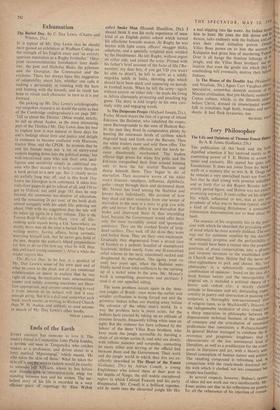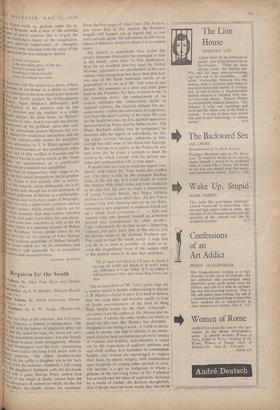Tory Philosopher
The Life and Opinions of Thomas Ernest IMO By A. R. Jones. (Gollancz, 25s.)
THE publication of this book and the fairly dignified attention it has received testify 10 lire continuing power of T. E. Hulme to arouse je: terest and curiosity. His appeal has quite soli° foundations. It does not come from his being 3, myth or a mystery (for so was A. R. Orage an he remains 'a very specialised taste) nor from ttrt fact that he died young with promise unfulfilled and so forth (for so did Rupert Brooke, now strictly period figure, and Hulme was not exactly promising anyway). It rests rather on his origi113• lity, which, influential or not, was at any rate prophetic of what was to become typical, and on a kind of thumping Britishness, a consciously'' Johnsonian determination not to beat about the bush. The essence of his originality lies in the Preei., sion with which he identified the prevailing stela.'
of mind which he most acutely disliked. The O` way out for someone repelled by the doctrill
of automatic progress and the perfectibility `),, of man would have been a retreat into the prepare', positions of pious conservatism, into a gloomy" and reverent devotion to the established order' in Church and State. Hulme had the nerve and clear-sightedness to pick and choose. His 'WY philosophy' is a substantially unprecedented combination of opinions: based on the idea of 3 fixed human nature and the inescapability of original sin, it included a political theory of 3, heroic and violent elite, a strictly classical attitude to literature and art, demanding imPer; sonality in poetry and abstraction in painting and sculpture, a' thoroughly non-sacramental vievi of religion (seen, as in Machiavelli's Discorsi, 35 the indispensable inculcator of civic virtue) and a sharp separation in philosophy between the 1\ dispassionate technical business of the analysis , of concepts and the articulation of emotional preferences that constitutes a Weltanschauung. In general Hulme managed to combine the ir. reverence and pragmatic toughneis that 15, characteristic of the less sentimental kind 01 liberalism, as well as a predilection for the avail' garde in literature and art, with a bluntly anti' liberal conception of human nature and politics, The resulting compound is refreshing and, 16 comparison with the ready-made doctrinal out- fits with which it clashed, not less consistent bill simply less familiar. In several respects, however, Hulme's system of ideas did not work out very satisfactorily. Mr' Jones points out that in his reflections on 130010' for all the vehemence of his rejection of roman' Hulme winds up, perhaps under the in- of Bergson, with a view of the essential 4cter of poetic creation that is largely the as Coleridge's theory of the imagination. ,(1\v° poetical experiments or examples, ulerfnOre, were saturated with the relics of the "e Poeticism he was aiming to destroy. A frolic of crimson is the spreading glory of the sky.
heaven's jocund maid
flaunting a trailed red robe
along the fretted city roofs. . .
hsession with the sunset as a poetic subject jn Perhaps be attributed to a desire to reveal "Z technique in the most recalcitrant medium eon hardly explain his O'Shaughnessy Again Bergson's philosophy, with glorification of the intuitive and its low u°f precision and the intellect, is a wildly :liable adjunct, let alone basis, for Hulme's orai Point of view. And it was only the sketchy f In1Pleteness of his political views that con- lbe unresolved tension between his irre- lit disdain for traditional institutions and the d " of the unimprovable masses for diScipline. u°1)' alternative to T. S. Eliot's genteel and „ "s've endorsement of the established order. a 1.1). out of this conflict, is Fascism and to tends, an Fascist is not so much, as Mr. Jones e,11(1s; an anachronism as a conditional P it tre.eY whose condition was unfulfilled. 21111e had an impressively wide range of in- qs and this makes\ demands, on his biographer • \1r. Jones is not entirely able to satisfy. tf of his remarks about philosophy .are a bit the (Nairn side though not to the detriment of general judgment of Hulme as a philosopher. hundred and forty-three pages of biography filled out with a definitively complete edition h °Imes poems, which should clearly not be 11.111ore seriously than their author intended to be, and some journalistic bits and pieces. itre some new anecdotes as well as the old t.lrites (there-. is a pleasing account of Hulme ing Wyndham Lewis upside down by his er turn-ups on the railings.of Soho Square) f„a,irlY copious quantities of Hulme himself. Prose which for all its clumsiness and enssness is still admirable for its exemplary teness and vernacular force.
ANTHONY QUINTON







































 Previous page
Previous page